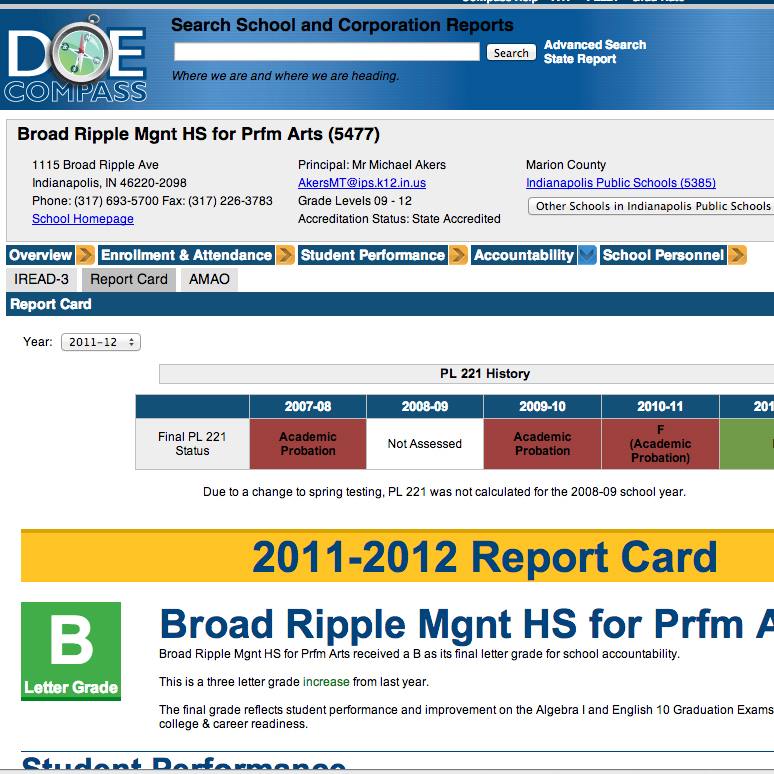State Board Recommends No Changes To Letter Grades Assigned In 2012

Elle Moxley / StateImpact Indiana
State Board of Education members Gordon Hendry, Dan Elsener, Cari Whicker and Brad Oliver listen to a presentation on the A-F accountability system during the October meeting.
The State Board of Education declined the opportunity to make any changes to the letter grades Indiana schools received in 2011-12, the first for the state’s A-F accountability system.
In total, the Indiana Department of Education flagged seven schools whose grades changed as a result of the previous administration’s application of rule. That means three high schools — Rossville, Northview and Speedway — will get to keep the A’s they received two years ago.
State Superintendent Glenda Ritz expressed her preference would be to “hold harmless” the schools that would be negatively impacted by a change. At least at first, board member David Freitag advocated for state officials to recalculate the three high school’s grades, giving them the B’s they should have received.
That was the recommendation of John Grew and Bill Sheldrake, the authors of an independent report reviewing the state’s A-F accountability system.
“Technically, I agree with you,” Dan Elsener told Freitag. “But practically, those tests have been taken.”
So the board — minus Ritz, who abstained from voting on the grade changes — agreed to let those A’s stand.
But Ritz says if those schools’ received the same test scores in the future, they would receive B’s. That’s because last year the Indiana Department of Education calculated the grades independent of category “caps” meant to keep schools from allowing good scores in one subject area to cancel out not-as-good scores in another.
“It is very clear in rule on high school that it is to have the caps,” says Ritz, adding that they will be included in the upcoming 2012-13 letter grades, which have not yet been released.
Ritz’s staff also recommended holding harmless four other schools that received F’s in 2011-12. At issue is how the state handles so-called “combined schools” that serve elementary, middle and high school students.When the State Board wrote Indiana’s accountability rules, they created several options for high schools with non-traditional configurations — for example, schools that only serve ninth and tenth graders, or schools that only serve eleventh and twelfth graders.
But at the time, the board did not address what to do with schools that served both elementary and middle school students as well as some high school grades. So when the Department of Education calculated those grades for 2011-12, staffers under former state superintendent Tony Bennett decided to determine those scores using the elementary/middle school model only.
At least two of the four schools that received F’s appealed, asking for the inclusion of high school data.
Sarah O’Brien worried that reconsidering those appeals could open the State Board of Education up to liability.
“If we open up the appeal process for these four schools, do we legally have to open it up for all schools?” she asked.
But Tony Walker argued that the four schools suffered a disadvantage through no fault of their own.
“It’s our own lack of foresight,” he said. “We knew these schools exists and we didn’t have a model for them.”
Still, the majority of the board voted in favor of allowing those F’s to stand, just as they did the A’s. Only Walker voted against the motion, saying he didn’t think it was fair that those schools were one step closer to state intervention. Again, Ritz abstained.
The board then voted in favor of the creation of new, hybrid models for combined schools that would allow department staff consider both the elementary/middle school model and the high school model when calculating scores.
The decision will impact how 2012-13 (and in all likelihood, 2013-14) letter grades are calculated, but after that Indiana will have a new A-F accountability system that state education officials are in the process of writing now.
As for when schools can expect their letter grades, Ritz says her staff plans to release all the preliminary data soon. But it will likely be next month before any final grades come out.



